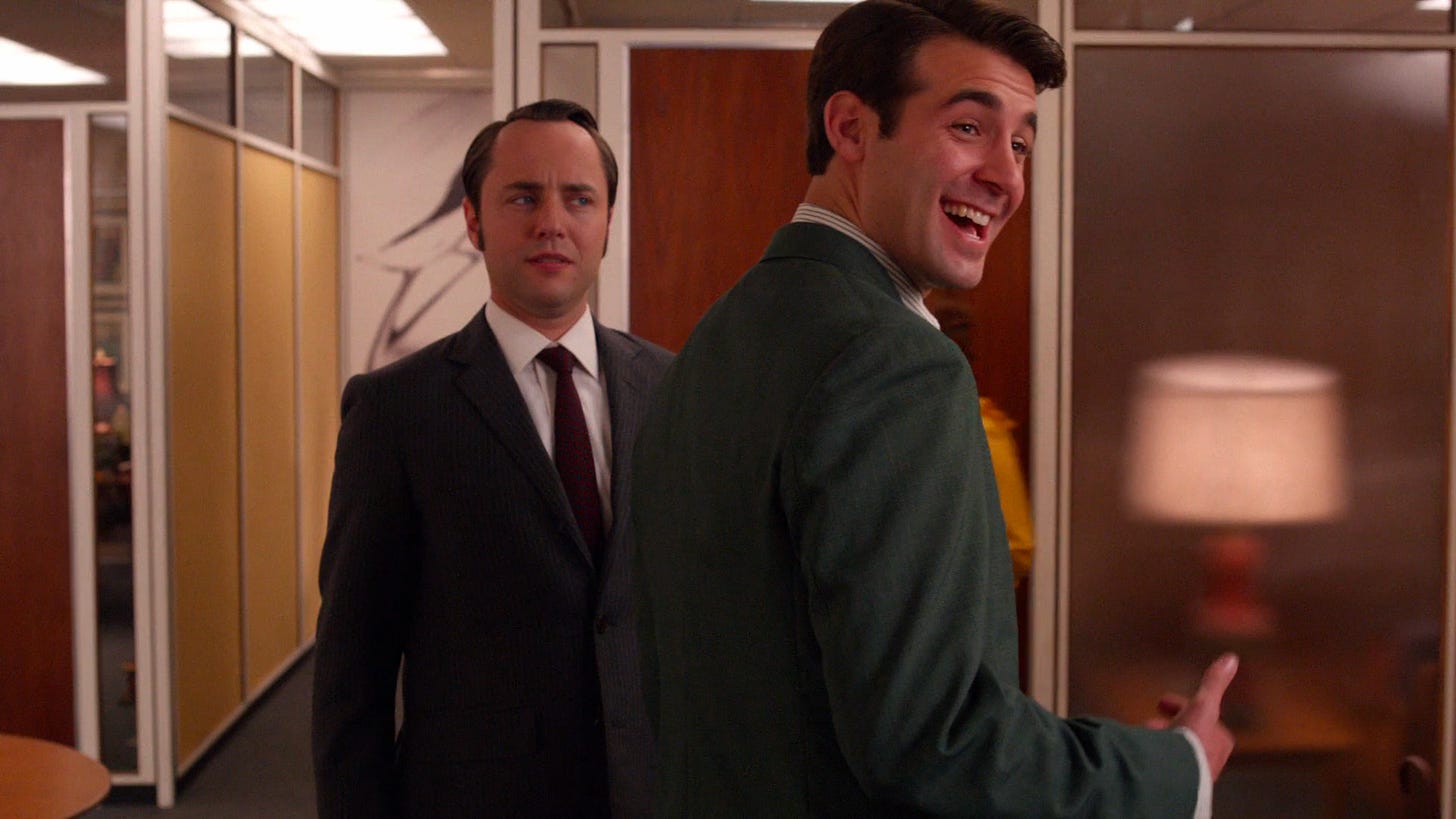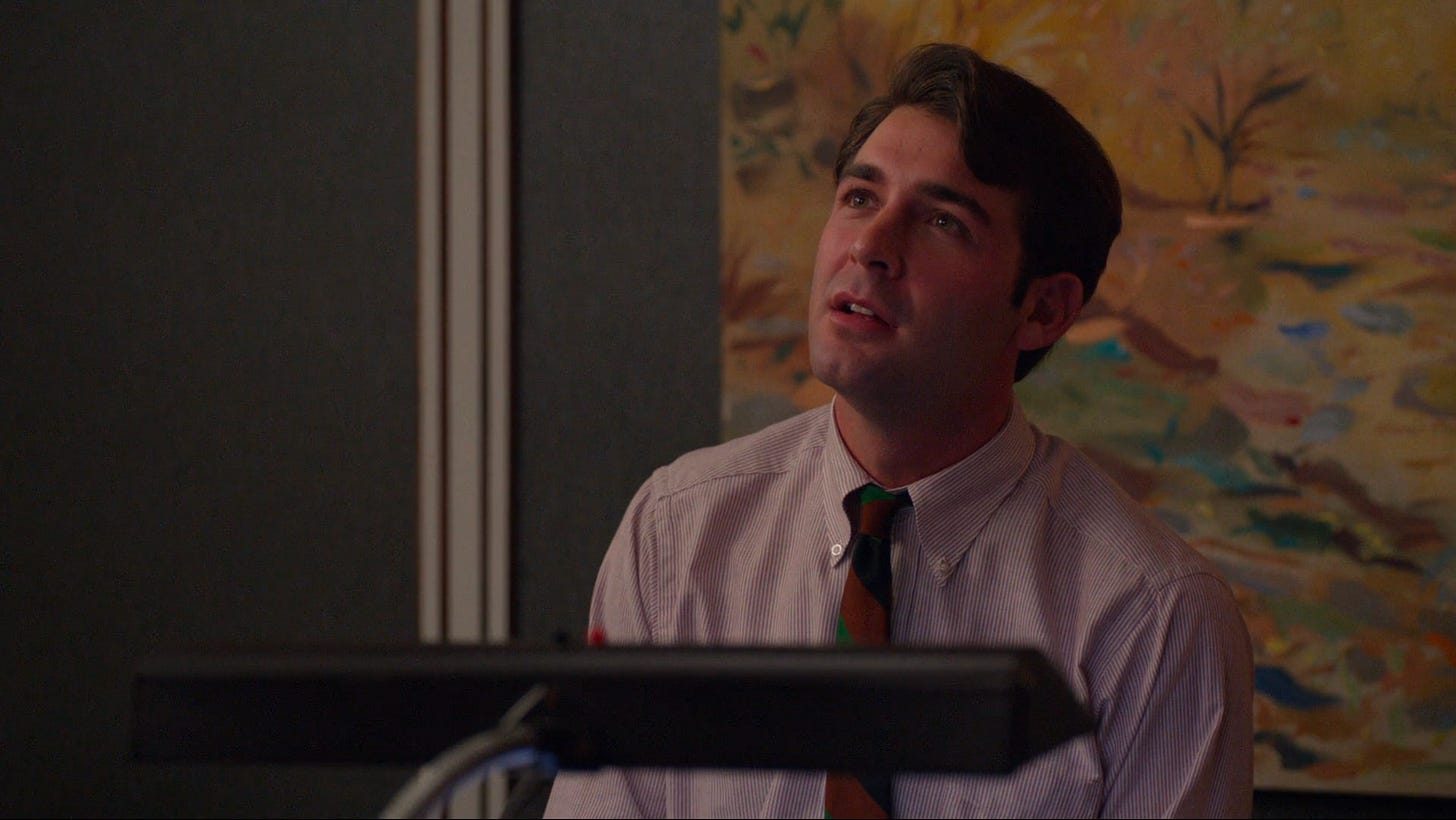What About Bob?
I watched every Bob Benson appearance in Mad Men and all I got was this essay about Ivy League style and the inner life of the outsider
“Enthusiasm is contagious. If you act and talk enthusiastically, you’ll project that quality -- and your listeners will react in the same way.”
-- Frank Bettger, How I Raised Myself From Failure to Success in Selling (1952)
I’ve hung around the Ivy/trad internet long enough to know that you can’t win talking about Mad Men. Ivy fans vacillate wildly between hating the show for not putting every character in J. Press (and thus spreading its pop culture phenom bounty beyond skinny ties and that one Brooks Brothers collection) and hating the show for getting all of the natural shoulders and oxford cloth button-downs it did include all wrong. While I personally would have put Roger Sterling in Press, I’m also not Mad Men costume designer Janie Bryant, who has often spoken about her character-driven wardrobe decisions on the show (head on over to BAMF Style for fantastic dissections of Don Draper’s clothes throughout the run of Mad Men).
So, look -- if Bryant didn’t put every character in Ivy, she probably had good reasons (and has the Emmy to prove it). Whatever those reasons were, one effect was certainly to add some depth to the character of Bob Benson, a junior executive (more on that later) expertly and enthusiastically portrayed by James Wolk. Benson describes himself as a graduate of Beloit College (in Wisconsin) and the Wharton School of Business, and essentially glad-hands his way onto the team at Sterling Cooper without anyone ever firmly knowing who he is or what he does. But for those of us with a penchant for spotting 3/2 rolls and repp ties, Bob Benson sticks out as the one most consistently Ivy-attired character in the entire run of Mad Men. Benson is always offering someone something, like a coffee, or something from the deli, or dispensing cheerful platitudes (“It’s a very important meeting, and I don’t say that to scare you, I say that to inspire you”). In one episode, he is seen listening to Frank Bettger’s self-help record How I Raised Myself From Failure to Success in Selling, and he certainly follows his advice -- he is enthusiastic to the end. Indeed, in his last appearance on the show, after Pete Campbell has discovered his secret and Bob is hightailing it to Detroit before the walls come tumbling down, we get one of my all-time favorite lines of the entire show, when Benson gives Joan’s son an Erector set with the heartfelt explanation, “America needs engineers!”
Ah, yes, the downfall. You see, Bob didn’t go to school in Wisconsin, and he didn’t go to Wharton. He’s from West Virginia, and his only previous executive experience was essentially being what he is at Sterling Cooper -- the guy who gets coffee for the real executives, except then he wasn’t pulling executive pay at the same time. He’s a fraud. Bob was a mini-zeitgeist during the show’s run. His chipper earnestness was a near-anachronism for the show, which by that point was more concerned with the slow fracturing of late-1960s America as mirrored in the personal lives of its tortured main characters, and it gave him an uncanny quality, like a man living in his own bizarro-world personal Truman Show that no one else was in on. His clothes reflect this: clean-cut, pure, innocent American style of the kind that the likes of Roger, Ted Chaough (I didn’t fact-check this spelling but if it’s wrong I blame Matthew Weiner for making it so complicated*) and Harry Crane were ditching as fast as possible to fit in with the new trends. As with his personality, Bob’s clothes “project the quality” of the guy who’s just happy to be there, giving out coffees. In a world where literally no one is happy, ever, that ends up looking pretty weird.
I don’t think this character would be possible dressed in anything but Ivy, and I also don’t think this character would be possible if anyone else was, either. As Bob’s famous elevator exchange with Pete illustrates, Bettger’s self-help advice only works when the other guy plays along. Bob is playing the part of a personality-less everyman, the guy who fades into the background, yet his beautiful striped ties and poplin suits end up making him look as oddly out of place as his awkward and ill-timed attempts to ingratiate himself with the big dogs at Sterling Cooper. His alliterative name is theoretically even more Wonder Bread than that of the agency’s reigning fraud, Don Draper, but where Don’s nom de vie (if you will) slides quickly and easily off the tongue, like a movie character’s name, Bob Benson stutters its way out, never quite landing easily on its feet.
Of course, Bob’s Ivy clothes are not only a miscalculated attempt at fitting in. They are a protective shell, like his supposed Wisconsin heartland background and impeccable (if unsubstantiated) MBA credentials. Bob, it becomes clear over the course of his trajectory, is gay, and the moments when he has to laugh off or move past scrutiny and slurs are some of the most poignant of his run on the show. “There’s that sense of humor,” Bob smiles without missing a beat after Michael Ginsberg asks him if he’s a “homo.” His face after Pete spits out the word “degenerate” is heartbreaking.
I’m reminded of a recent essay by Edmund White in The New York Times Style Magazine about Tom Ripley, in which White writes, “I grew up gay in the 1950s and I had to pretend to my classmates, fraternity brothers and, later, office mates to be straight. It was a disgrace to be homosexual, and before the beginning of gay liberation many of us (including me) were going to shrinks with the sole goal of turning heterosexual.” For White, Ripley represents the elisions of identity required of societal outcasts, including those in the LGBTQ+ communities. “Tom Ripley may not be gay, exactly,” White writes, “but he does first impersonate an Ivy Leaguer, then a forgotten acquaintance, and finally Dickie himself, copying his signature, wearing his rings and lightening his hair.... The art of impersonation was an essential skill for closeted lesbians and gays in the 1950s.”** Ivy League style is, I would argue, the most normative style still extant, and was so even by the mid-1960s — for someone who does not see themselves represented in those norms, I can only imagine how deeply oppressive that style would be, a kind of willful dissociative act that would have profoundly traumatic consequences.***
Bob’s oxford shirts and repp ties, then, are not only a misguided attempt at infiltrating a world of easy money and career success; they are a way of coming out of the cold, of shedding the Outsider (whether of sexual identity or class — Bob is from West Virginia, and Duck jokes about his parents being siblings) and donning the Insider. The only time we see Bob fully drop his facade is during an impassioned Spanish-language telephone call with Manolo, the nurse he has recommended Pete hire for his aging mother, urging him not to marry her:
Seeing these contorted facial expressions on the usually placid Bob is upsetting, but it’s telling that we learn first that Manolo seems to actually see Pete’s mother as a nice woman (did she actually fall overboard accidentally?) and that Bob is deeply, violently invested in his future — not simply his career, but his own survival. When Pete confronts Bob over his secret past, Bob’s face falls. “What do you want?” he asks, forlornly. “Well for one thing, I wanted you to stop smiling,” Pete says.
It’s a heart-rending exchange. Bob’s smile is odd, quirky, but also desperate, white-knuckled. His smiles are a full-time job; he wears them “to project the quality of enthusiasm,” not only to his colleagues, but to himself. He leaves Joan to the wolves — he has to, for his own survival. As Pete comes within a centimeter of shattering Bob’s entire life, you start to feel Bob’s fear, his need for a protective shell, whether of good teeth, a hot cup of a coffee, or a university stripe button-down shirt.
At what cost this shell comes, we are never explicitly told, but we see it in that face in Pete’s office, and more closely in his relationship with Joan, another outsider who has clawed her way into the inside, where she clings tenuously to the bare minimum of what she deserves and what her male colleagues make, and take, without a second thought.
Bob is more acutely aware of Joan’s needs and feelings than any other man (or, arguably, woman) in her life, but his goodbye is also incredibly cruel. Bob’s final entreaty to Joan is a plea from one outsider to another -- don’t trust these insiders, they don’t really know you, they won’t take care of you. But the reality for both of them is that they have to keep up their appearances, even if it means deeper isolation or rejection from someone who finally seems to understand. As for Bob himself, his new life in Detroit will be full of coffees and beautiful suits, and undoubtedly many coffee cups full of enthusiasm — and even, I hope, some happiness.
NOTES:
*Okay, I did check it just now, and I’m shocked that I nailed it on the first try. Chaough. Chaough. Damn, I’m good.
**The visceral, sexual love for Alain Delon and even Matt Damon’s pretty Tom Ripleys in the Ivy-verse — along with icons like Steve McQueen, Sidney Poitier, et. al. — is ripe for closer examination. #Menswear is deeply invested in masculinity, and is pretty insecure about being primarily concerned with fashion, aka girl stuff. Hence our rugged, athletic style icons, our signaling that we care a lot about boobs and sports, and our obsession with all the little things that set our clothes apart from the stuff in Vogue, or (God forbid) the men’s section of Vogue — tradition, artisanal craftsmanship, long-lasting quality, heavy leather and cotton, etc. Pointing to stuff like this is low-hanging fruit. Look in the mirror, instead.
***And, for all of the empathy Mad Men displayed in its characterizations of Sal and Bob (and Dawn, and Ginsberg), it also wrote them out of the show fairly quickly, leaving the history of Sterling Cooper to be portrayed by the straight and the white, if also the troubled. Lane Pryce gets a measure of regret and respect from Don that neither Sal nor Bob ever gets from the show as a whole.

















